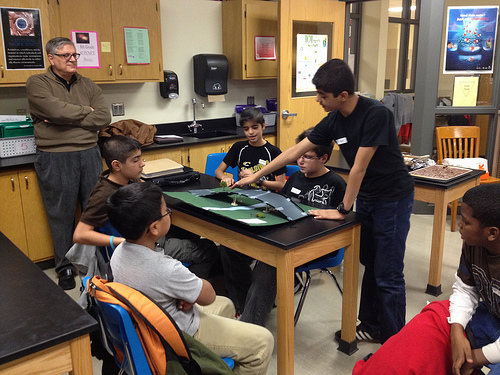InTrans / Jul 21, 2013
Five reasons to be a transportation engineer
Go! Magazine

posted on July 31, 2013
When you hear the word “engineering” what do you think? Really difficult math problems sharpied on dirty windows was always my first thought. That is why I am writing this article and not designing an engine for Rolls Royce. But, after talking to some passionate and extremely accomplished transportation engineers, I have discovered that transportation engineering is about much more than aimlessly crunching numbers. Here are some of the “Top 5” reasons to check out transportation engineering as your future career.

- You get to have fun. No, really, you do, just ask Scott Sorensen, a master student at the University of Nebraska. Sorensen was in charge of an after school program centered around introducing engineering principles to middle and high school-aged students. He designed projects like building a road on unsteady pudding or creating circuits out of Christmas lights. Sounds pretty interesting doesn’t it? And the “real world” of engineering is no different, Matthew Arnold would argue. Professor Charlie Nemmers, director of the University of Missouri’s Transportation Infrastructure Center, really sums it up, “We have fun!”
- You aren’t confined to an office (but you can be if you want). Arnold explains that with transportation engineering, you get to do hands-on projects that you may not even realize would be part of engineering. A lot of the work can be outside, which gives you the freedom to break out of cubicle monotony. However, for those of you who do not want to be exposed to the elements, Professor Ying Huang at the University of South Dakota reveals that there are office jobs in transportation engineering that are just as challenging and important as those that can give you a sunburn.
- You will be working with cutting- edge technology. Where else can you experiment with self-driving cars, structures that can “feel,”pavements that pretty much “eat” pollutants, and trains that levitate? That’s right. Nowhere else, except maybe the Matrix.
- You will always have a new challenge awaiting you. The work of transportation engineers is never finished because there are constantly new improvements that can be made to better the current system. Tomas Lindheimer, a PhD student at the University of Kansas, says that the challenges of transportation make it a rewarding and mind-opening profession. Working alongside professionals in many other disciplines, you get the chance to approach problems from different angles and learn “a lot about everything.”
- You get to help your fellow humans. Transportation engineers from Nebraska to Iowa and Kansas to Missouri all agree that being able to work at a job that makes a difference in the lives of other people is the ultimate reward. Professor Ying Huang warns that this is a responsibility that future transportation engineers should not take lightly, and she advises students to make sure that they are passionate about the field, which will inspire them to be more motivated in their work.
Though you will need to “withstand” a few years of tough math courses,” as Lindheimer puts it, the end result will be completely worth it.
You know the old saying, “If you love what you do, you never have to work a day in your life,” and, from what I have gathered, transportation engineers really love what they do.
By Kelly Mantick, Go! Staff Writer